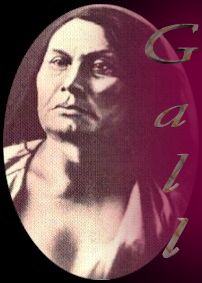

Gall was a Hunkpapa chief who played a leading part in the Lakota's long war against the United States. Gall encouraged his peo0ple to accept assimilation once they were confined on reservations.
Gall was said to have gained his unusual name when, as a famished orphan, he ate the gall of an animal killed by a neighbor. He rose to prominence among the Lakota as a warrior in Red Cloud's campaigns. He later allied himself with Sitting Bull and others who refused to remain within the territory set aside for them.
Gall eventually became Sitting Bull's military chief, and led attacks on army troops along the Yellowstone River in 1872 and 1873. At the battle of the Little Bighorn in 1876, he led the Hunkpapa warriors who first drove Major Marcus Reno from the Lakota's encampment and then swept north to join Crazy Horse and his forces in the attack on Custer.
Following the Custer fight, Gall fled with Sitting Bull into Canada, but a quarrel between them caused Gall to bring his band back across the border late in 1880. He finally surrendered on January 3, 1881, and was settled on Standing Rock reservation in Dakota Territory, where he became friends with the man who would prove himself Sitting Bull's most determined antagonist, Indian Agent James McLaughlin.
On the reservation, Gall seemed to forget his former militancy and became instead a champion of federal efforts to "domesticate" the Lakota. He lent his prestige to the reservation farming program and became an active supporter of plans to educate Native American children in special schools. In 1889, he even became a judge on the reservation's Court of Indian Offenses. That same year, he gave his consent to a reduction in the reservation's size, despite Sitting Bull's vigorous opposition.
Gall died on December 5, 1894, at his home on Oak Creek in South Dakota.
